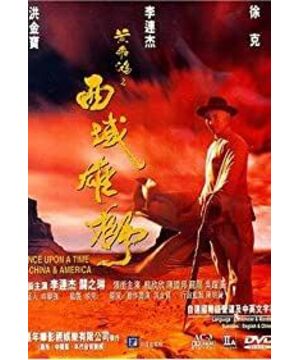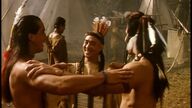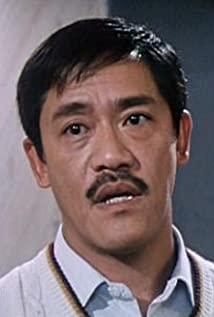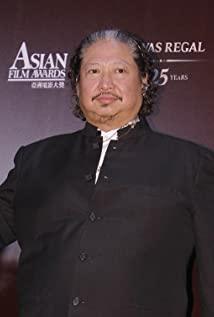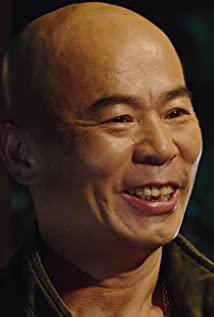Although many people don't rate the sixth Lion of the Western Regions highly, and even complain that it's nondescript, I think it's pretty good-looking. Even if the director was replaced by Sammo Hung, it still maintained the consistency of Tsui Hark's martial arts version of Huang Feihong series.
First of all, I don't think this series (1 Top Gun 2 Men Be Self-improvement 3 Lion King Fight for Hegemony 4 King's Wind 5 Dragon City Traitor 6 Western Regions Lion) belongs to Jet Li and the two starring Zhao Wenzhuo are equally wonderful, and even this does not belong to Huang Feihong, Huang Feihong's series of movies have long been famous before this, the most famous is Guan Dexing, and many other people have also performed wonderful Huang Feihong. And this series belongs to Tsui Hark's unique martial arts version of Huang Feihong.
Tsui Hark has always been known for his martial arts movies. In my impression, he doesn't seem to have made many kung fu movies, and he is probably not good at it. Therefore, he adapted Huang Feihong into a martial arts, and uphold Jin Yong's idea of a hero who serves the country and the people, integrated Huang Feihong's deeds into modern Chinese history, and created a national hero Huang Feihong.
The first Huang Feihong's Top Gun opened with a scene where Huang Feihong and the black flag army Liu Yongfu were talking about national events. Huang Feihong was directly put into the history book, and a folding fan with an unequal treaty was also given as a gift. It is also very interesting that the folding fan was burned out in the subsequent fire and turned into an equality treaty. After the opening song, the leisurely entertainment of the Qing Dynasty citizens in the teahouse, officers and soldiers escorting prisoners on the street, foreigners shopping in the street, Christian missionaries, and overwhelmed Buddhist monks. The noise even competed, and then it was suppressed by the roar of steam on the ship. In just two minutes and a few simple shots, the background of the times was explained, and the social status of the late Qing Dynasty was vividly depicted. Although the visual sense of the history book at the beginning is in contrast, it complements each other. The foreign settlements that appeared later and the leaflets distributed on the streets to Jinshan (United States) should indicate the theme of this film. The Chinese also had the same experience as the black people and were sold as slaves. From the perspective of the whole series, this one is mainly to explain the background, and then it is the backwardness of the times when Yan Zhendong, a Shandong martial artist, used the iron cloth shirt to express the kung fu.
The second Wong Fei-hung's man should be self-improvement, and many people think it is the best in the series. At the beginning, there was a white lotus sect pretending to be a ghost, wiping it with lit incense like removing body hair, trying to resist foreign guns and cannons with flesh and blood, burning piano clocks and other foreign goods even including a cute Dalmatian dog, after Master Huang The plots such as taking the train, denounced Li Hongzhang on the streets of Guangzhou, and scolded by the thirteenth aunt as fake foreign devils are the same as the first part. At the seminar on Chinese and Western medicine, Master Huang's brilliant skills stunned foreigners. Then he was attacked by the White Lotus Sect, and a foreign doctor was shot to death on the spot. One can't help but think that the foreign ambassador's statement when he quarreled with Qing officials that "we foreigners are too dangerous in China" is really justified. Donnie Yen's role will inevitably involve milk slipping, so I won't say much about it. In the two boss battles, one is Master Huang's smashing of the White Lotus Sect, and the other is to protect the revolutionary party and kill the Qing Dynasty ministers. The theme of this part is also obvious. However, the biggest highlight seems to be Donnie Yen's cloth stick.
The third film Huang Feihong: The Lion King's Contest for Hegemony. The highlight of this film at the beginning was the appearance of Empress Dowager Cixi and the representatives of the Eight-Power Allied Forces in Tang suits. Then it was still the scene of the train, and the stage was moved from Guangdong to Beijing. The lion dance really became the protagonist this time. The Japanese-Russian battle of Tsui Hark will not be mentioned. The highlight of this episode is Xiong Xinxin's Ghost Foot Seven and Master Huang's Thirteenth Aunt giving candy to a single dog. In addition, Mo Shaocong's Liang Kuan is a little bastard, but he is really too cute.
The fourth film Huang Feihong's King's Style, many people blame Zhao Wenzhuo for being inferior to Li Lianjie for the decline in this film, it is really biased, this film has become more than just the protagonist, the director has also changed, and there are many scenes I have played it before, and the plot is more like a supplement to the previous one, and the lion dance continues to play the leading role. The conflict between traditional religions and Christianity is intensifying, or traditional superstitions are getting darker and darker, and priests are good people to the end. From this part, Master Huang's peach blossom luck has become more and more prosperous, but Jet Li can't enjoy it. The 14th aunt, who appeared in place of the 13th aunt, ran a newspaper to talk about women's rights, but Master Huang was disdainful, and the other warriors didn't even know the word. The Red Lantern Sect took the place of the White Lotus Sect and did harm to the world under the guise of helping the Qing Dynasty to destroy the foreigners, while Qian Jiale and Zhou Billi, who were anti-Qing and Fuming, simply became the puppets of the foreigners, and the confrontation between the two parties was too straightforward. Of course, we all learned in the history class. In the end, both sides failed. The Eight-Power Allied Forces won, and Lafayette ran away. The disappointed Master Huang had to go back to the south.
The fifth Huang Feihong: Dragon City Raiders, this one has been said by many people to have changed its taste, but I like it very much. Tsui Hark returned to the position of director, and Master Huang, who went south, did not leave the history of the late Qing Dynasty. Profitable merchants kept food, the government declined, and bandits were rampant. This is the southern part of China under the background of the era at the end of the previous film. The newspaper said that the South was still prosperous, and Master Huang complained that this time it was really useless to read. Who stipulated that this series must maintain the taste of the first three? What's the point of no change? Continue to play old tricks like the last one? Master Huang picked up a gun to do pirates, in my opinion, it is really a bold idea of the art masters, and the peach blossom luck is still maintained, and the two aunts are jealous and cute. Aso is no longer just a translator. The sharpshooter's setting allows him to have action scenes too. At the end of the film, two people from the imperial court came down to take over the local government, which also continued to show the history of the late Qing Dynasty. In addition, why did the father of the country become an official?
The sixth Wong Fei-hung: The Lion of the Western Regions, although it left China and joined the style of American Western films, it still adheres closely to the modern history of China. This time it is the history of overseas Chinese struggle. The director was replaced by Sammo Hung, the starring Jet Li returned, and the filming was a few years away from the last film, so the plot connection was not as close as before. Even in the United States to fight side by side with western cowboys, A Su and A Qi did not continue to play. The gun is a pity. On the contrary, it was Aunt Thirteen, who could even know the shadowless feet. (laugh)
In general, except for the fourth and last films that Tsui Hark did not direct, I think they are all five-star praise. This is a very rare and excellent series of movies that combines various genres such as kung fu, martial arts, western, etc., not only serious thinking about the nation, history, country and individual, but also full of entertainment.
View more about Once Upon a Time in China and America reviews


